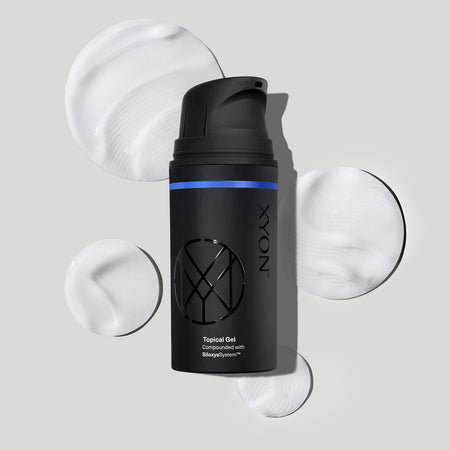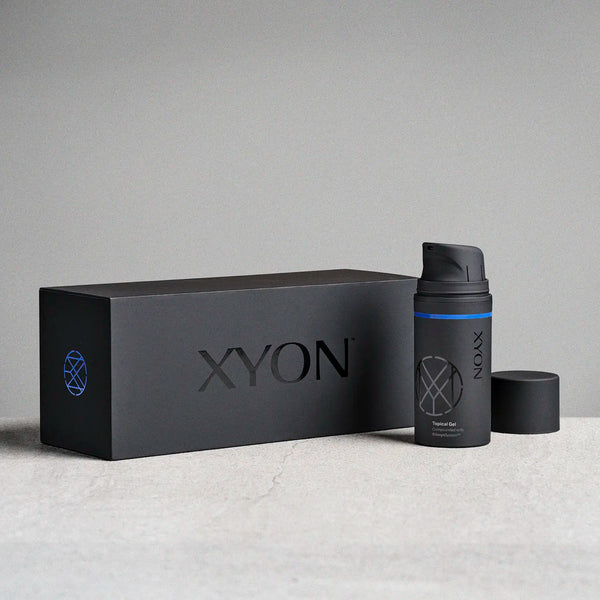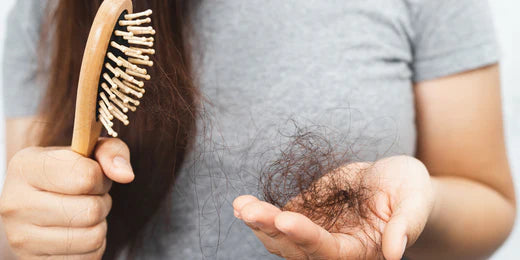If you find yourself losing more hair than usual when you’re feeling stressed, you might be wondering if the two are related. Well, it’s true that stress can sometimes contribute to hair loss, but the exact mechanisms behind this link aren’t fully understood. Contrary to popular belief, stress doesn’t cause the most common type of hair loss, known as pattern balding. In other words, it isn’t the cause of a receding hairline. But stress can cause or worsen other hair loss disorders and this could be due to the effects of stress on the hair growth cycle.
So, how exactly is stress related to hair loss?
The link between cortisol and hair loss
Have you ever wondered what actually happens inside your body when you feel stressed? Initially, stress triggers the release of adrenaline and other related hormones to initiate the ‘fight-or-flight’ response in the body. Following this, a steroid hormone called cortisol is released which helps to maintain the fight-or-flight response after the initial trigger. Examples of some of the effects of stress on the body include disruption (suppression) of the immune system responses and slowing of the digestive system. This is all part of limiting non-essential processes during times of high stress.


Worried about hair loss? We have solutions.
Topical finasteride makes using hair loss treatment easy. Connect with a doctor to find out if it's right for you.
Typically, cortisol levels return to normal once the source of stress has passed. However, prolonged stress can cause chronically elevated levels of cortisol and this can have an impact on the health of various parts of the body, including the hair.
Cortisol is known to affect the growth cycle of hair follicles (Thom, 2016) and it’s thought that the other hormones involved in hair growth, such as dihydrotestosterone (DHT), can become imbalanced when cortisol is chronically high. Interestingly, a mouse study looking at the relationship between cortisol and the hair growth cycle found that when circulating cortisol was high, the resting stage of the follicle was extended (Choi et al, 2021), which meant that hair growth was minimal. This research also noted that the stem cells in the hair follicles regenerated many more times with low cortisol, which resulted in better hair growth.
This research begins to explain the link between stress and hair loss in the case of chronic stress, but let’s take a closer look at the different types of stress-related hair loss and the mechanisms behind these.
Types of stress-related hair loss
Telogen effluvium
Telogen effluvium is a type of hair loss that causes excessive hair shedding and it typically begins around 3 months following a stressful event or other stressful situations on the body, such as a change in medication. It's characterized by diffuse hair thinning across the scalp.
On a healthy scalp, around 85% of the hairs will be in the active (anagen) growth stage at a given time (Hughes et al, 2024). When someone is experiencing telogen effluvium, a considerable number of hairs enter the telogen phase and as a result, a higher quantity of hairs are shed. Fortunately, telogen effluvium is usually not permanent. Once the triggering factor has been addressed, many patients notice hair regrowth within 3-6 months (Malkud, 2015).
Trichotillomania
This is a form of hair loss characterized by the urge to repetitively pull hair out and the hair pulling is often not limited to the scalp. Whilst trichotillomania isn’t a direct result of stress, it is often associated with other mental health conditions and stress can often be a triggering factor.
Unfortunately, we don’t have a great understanding of what exactly causes trichotillomania, so treatment can be difficult. It will usually come down to addressing the psychological aspects of this condition, which often involves learning to recognize triggering factors. Replacing the repetitive hair pulling behavior with a less harmful repetitive behavior, such as squeezing a stress ball can sometimes be helpful.
Aside from psychological support, some patients have seen promising results from taking a supplement called N-acetylcysteine. One study noted that N-acetylcysteine supplements were more effective at treating trichotillomania than the placebo, as well alternative pharmaceutical options (Odlaug & Grant, 2007). It’s thought that this supplement can alter the levels of a substance in the brain called glutamate, which helps to reduce unwanted behaviors, including hair pulling.
Alopecia areata
Alopecia areata is a hair loss condition which causes circular or oval bald patches to form across the scalp. It’s an autoimmune disease in which the body's immune system attacks the hair follicles, resulting in hair loss.
Whilst stress isn’t a direct cause, some researchers believe that it could be a trigger for people who are at a higher risk of developing it (Ahn et al, 2023). A previous study observed higher levels of anxiety and depression amongst patients in hospital with alopecia areata, compared to patients who didn’t have alopecia areata (Cakirica et al, 2020). Other studies have shown similar results (Chu et al, 2012), supporting the link between psychological stress and this type of hair loss. However, further research is needed to better understand exactly how the two factors are related.
Post-partum hair loss
Hair loss after pregnancy is not uncommon and it’s typically a form of telogen effluvium. Pregnancy can cause drastic hormonal fluctuations and these changes can have an impact on the hair growth cycle. Shortly after the placenta is delivered, estrogen and progesterone drop considerably while a hormone known as prolactin increases. Prolactin is responsible for controlling lactation, but in high concentrations it’s also been linked to stopping the growth of the hair shaft, causing hairs to enter the resting phase of growth early.
It can be worrying to experience excessive hair shedding following pregnancy but rest assured that once your body adjusts to the hormonal changes, hair growth will likely return to normal.
How to tell if your hair loss is due to stress
When you’re losing more hair than usual it can be difficult to pinpoint the exact reason, particularly if stress has coincided with worsening hair loss. Stress-related hair loss and hair loss due to androgenetic alopecia (or pattern balding) have some key differences in the way they present and progress and these can help to differentiate between the two. So, let’s take a look at some of these differences:
-
Presentation – Stress-related hair loss typically presents as diffuse thinning across the scalp, whilst male pattern balding usually begins as a receding hairline. Female pattern hair loss generally starts as a widening of the hair parting.
- Response to DHT blockers – Male pattern generally responds well to treatment with DHT blocking drugs, such as finasteride (it may be recommended for female pattern hair loss in some cases). Whereas, stress-related hair loss will not respond to DHT blocking medications.
- Progression of hair loss – Male and female pattern hair loss will not improve without intervention and will be progressive in nature, meaning the hair loss continues to get worse over time. Conversely, stress-related hair loss will typically improve on its own, but it may come back (this is known as a relapse).
- Physically noticing hair falling out – With stress-related hair loss, many people will actually notice the increase in hair shedding, including more hair falling out in the shower. Pattern hair loss is much more subtle in nature and most people don’t actually notice hair their hair falling out.
- Hair loss is in places other than the scalp – Stress-related hair loss can, in some cases, cause shedding in other areas of the body, including the eyebrows and eyelashes. Pattern hair loss is isolated to the scalp.
How to manage stress-related hair loss
When stress is playing a part in your hair loss, the best thing you can do is try to reduce your stress levels. We understand that is often easier said than done, but here are some suggestions to help you to manage stress:
- Exercising daily has been proven to reduce the effects of elevated cortisol levels caused by psychological stress (Caplin et al, 2021).
- A balanced diet, with all the essential vitamins and minerals is also crucial to maintaining healthy hair.
- It’s important to seek medical help if you’re struggling with your mental health and getting treatment may even help to improve or reduce your hair loss in some instances.
Beyond addressing the root causes of stress and improving your lifestyle habits, you could consider using hair care products such as shampoos, conditioners and styling products that are specifically designed to support healthy hair growth.
At XYON and we’ve developed a range of products intended to support your hair needs throughout your hair journey. If you’re looking for products to incorporate into a basic haircare routine, our Active Performance Shampoo and Conditioner for women contain natural ingredients with anti-inflammatory and antioxidant properties, such as apigenin and oleanolic acid. This can be particularly beneficial for stress-related hair loss, where there tends to be high inflammation and oxidative stress at the scalp.
If you’re someone who’s keen to take extra steps in their routine, our Revitalize Hair-Boosting serum contains specific growth factors which target hair growth and help with hair thinning by promoting healthy cell development.
Takeaway: stress and hair loss
It’s unlikely that stress is solely responsible for your hair loss, but it could be a contributing factor in some hair loss conditions. Taking the necessary steps to reduce your stress (wherever possible) is a good place to start and will likely be beneficial, not only for your hair but also for your overall health. If you’re experiencing hair loss despite addressing stress, we recommend connecting with a hair loss specialist at XYON to discuss your options. We understand that hair loss can be stressful and that’s why we’ve developed a range of non-medicated and pharmaceutical options to support you on your hair journey.
References
Ahn, D., Kim, H., Lee, B., Hahm, D.H. (2023). Psychological stress-induced pathogenesis of alopecia areata: autoimmune and apoptotic pathways. International Journal of Molecular Sciences, 24(14). https://doi.org/10.3390%2Fijms241411711
Caplin, A., Chen, F.S., Beauchamp, M.R., Puterman, E. (2021). The effects of exercise intensity on the cortisol response to a subsequent acute psycholoigcal stressor. Psychoendrocrinology, 131. https://doi.org/10.1016/j.psyneuen.2021.105336
Carika, G., Manav, V., Celik, H., Saracoglu, G., Yetkin, E.N. (2020). Effects of anxiety and depression symptoms on oxidative stress in patients with alopecia areata. Advances in Dermatology and Allergology, 37(3), 412-416. https://pubmed.ncbi.nlm.nih.gov/32792885
Choi, S., Zhang, B., Ma, S., Gonzalez-Celeiro, M., Stein, D., Jin, X., Kim, S.T., Kang, Y.L., Besnard, A., Rezza, A., Grisanti, L., Buenrostro, J.D., Rendl, M., Nahrendorf, M., Sahy, A., Hsu, Y.C. (2021). Corticosterone inhibits GAS6 to govern hair follicle stem-cell quiescence. Nature, 592, 428-432. https://www.nature.com/articles/s41586-021-03417-2
Chu, S.Y., Chen, Y.J., Tseng, W.C., Lin, M.W., Chen, T.J., Hwang, C.Y., Chen, C.C., Lee, D.D., Chang, Y.T., Wang, W.J., Liu, H.N. (2012). Psychiatric comorbidities in patients with alopecia areata in Taiwan: a case-control study. British Journal of Dermatology, 166(3), 525-531. https://doi.org/10.1111/j.1365-2133.2011.10714.x
Hughes, E.C., Syed, H.A., Saleh, D. (2014). Telogen effluvium. In: StatPearls [internet]. Treasure Island (FL): StatPearls Publishing.
Malkud, S. (2015). Telogen effluvium. Journal of Clinical and Diagnostic Research, 9(9). https://www.ncbi.nlm.nih.gov/pmc/articles/PMC4606321/pdf/jcdr-9-WE01.pdf
Odlaug, B.L., Grant, J.E. (2007). N-Acetyl cysteine in the treatment of grooming disorders. Journal of Clinical Psychopharmacology, 27(2), 227-229. 10.1097/01.jcp.0000264976.86990.00
Thom, E. (2015). Stress and the hair growth cycle: Cortisol-induced hair growth disruption. Journal of Drugs in Dermatology, 15(8). https://pubmed.ncbi.nlm.nih.gov/27538002/




